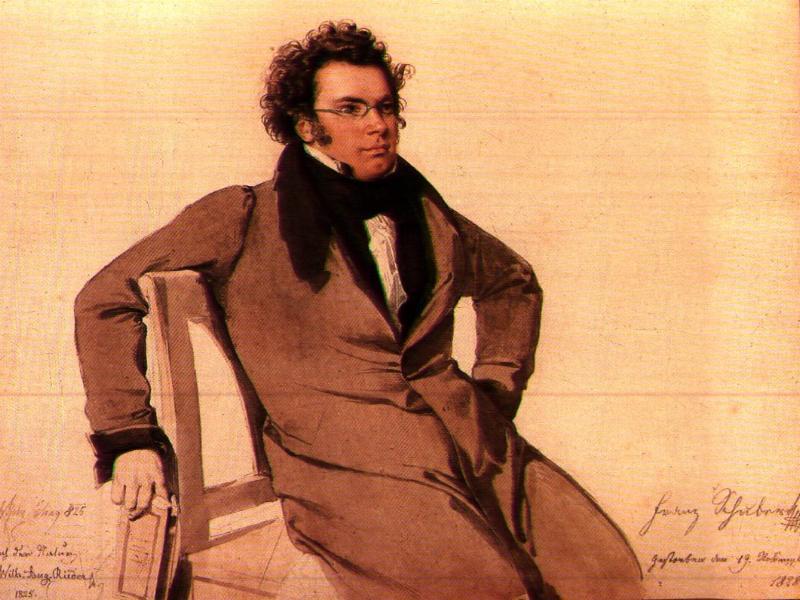
We mark the birth on January 31, 1797 – 225 years ago today – of Franz Peter Schubert, in Vienna. He died in that city 31 years, 9 months, and 19 days later, on November 19, 1828.
Franz Schubert is no stranger to Music History Monday. However, we could not let his birthday pass without a post; no way, no how. Our angle today will be to focus on those friends without whom Schubert the man and the composer could not have survived.
Schubert: Image and Reality
The short, pudgy Schubert was called by his friends “Schwammerl,” which means “little mushroom.” The fully-grown Schubert was 1.57 meters tall (about 5’1”) and as his portraits attest, he never lost his cherubic appearance. The following description of the adult Schubert was written by his friend Anselm Hüttenbrenner:
“Schubert’s outward appearance was anything but striking. He was short of stature, with a full, round face, and was rather stout. His forehead was very beautifully domed. Because of his short sight, he always wore spectacles which he did not take off, even during sleep. Dress was a thing in which he took no interest whatsoever; consequently, he disliked going out into smart society. He disliked bowing and scraping, and listening to flattering talk about himself he found downright nauseating.”
Writing in the book Schubert’s Vienna (Yale University Press, 1997), the musicologist Ernst Hilmar, the former Director of the International Franz Schubert Institute in Vienna, objects to what he perceives of as the “traditional” image of Franz Schubert:
“The image of the composer [Schubert] portrayed in most monographs is oversimplified and simply false. Schubert is presented as a chubby, shy, withdrawn genius, unappreciated and unsupported by society, who dashed off masterworks without any effort. There is some truth to this image, but precisely what is false?”
We would thank Ernst Hilmar for asking the question regarding precisely what is false about his description of Schubert. It would have been nice if he had bothered answering his own question, WHICH HE DOES NOT.
(Instead, in the grand tradition of intellectual dismissal, he merely claims that the traditional image of Schubert is “oversimplified.”)
Since Herr Hilmar did not answer his own question, we will do it for him.
Hilmar writes that: “Schubert is presented as a chubby, shy, withdrawn genius.”
No falsehood here; this is absolutely accurate.
Hilmar continues: “[Schubert was] unappreciated and unsupported by society, [a composer] who dashed off masterworks without any effort.”
This statement is not so much false as it is lacking in nuance.
Schubert did indeed “dash of masterworks without any apparent effort.” Regarding his own work habits, Schubert wrote:
“I work every morning. When I have finished one piece, I begin another.”
To which we would add, “and another, and another, and another.”
As to whether Schubert was “unappreciated and unsupported by society”, ah, well, if we properly define the word “society” as “the aggregate of people living together in a community,” then the statement is, in fact, accurate: Schubert was generally unappreciated and certainly unsupported by the greater Viennese society.
However, that doesn’t mean that Schubert was entirely unappreciated as a composer. Here’s the nuance part. By the end of his life (in 1828), Schubert was indeed locally known for his “smaller” works: for his songs and for his piano, chamber, and choral music.
However, we would observe that for a composer of Schubert’s range and ability, being known for his “smaller” works wasn’t even close to being enough. He composed nine finished and unfinished symphonies. Not a single one was published or publicly performed in his lifetime. He composed 17 operas, none of which was published and only two of which were staged – briefly and poorly – in his lifetime (both in 1820).
(For our information, Schubert’s operas occupy more space in the complete edition of his works than any other vocal or instrumental genre, a testament to how hard and long he worked on them without garnering any success.)
Schubert’s other large-scale works – orchestral overtures, masses, oratorios, and the like – also went unpublished and unperformed. Staging such large-scale works is expensive, and without a reputation and/or a number of important patrons with deep pockets, performances and publication of such works was simply out of the question.
Nevertheless, Schubert was supported and celebrated by a very special subset of Viennese musical society, and that would be his friends: the people who affectionally called him “little mushroom.”…
Continue reading, only on Patreon!
Become a Patron!Listen on the Music History Monday Podcast
Podcast: Play in new window
Subscribe: Apple Podcasts | Spotify | Pandora | iHeartRadio | RSS | More
